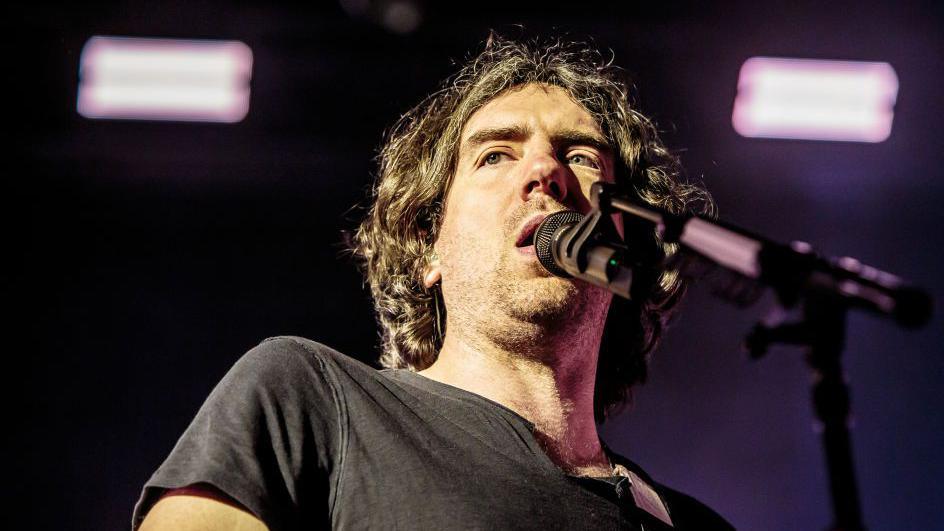Festival 'survived all sorts' as it celebrates 25th anniversary
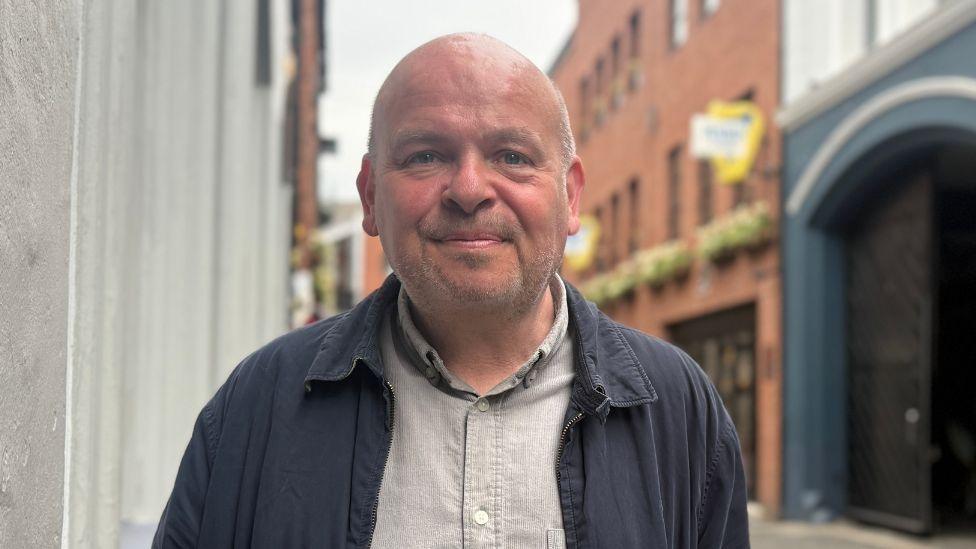
Cathedral Quarter Arts Festival was the brainchild of playwright Martin Lynch and developed by Sean Kelly (above)
- Published
"We've survived all sorts of challenges... We've had fires. We've had floods, a global pandemic, but we're still standing."
From "spit and sawdust" beginnings to a major 10-day cultural celebration, one of Northern Ireland's leading festivals is celebrating 25 years of showcasing the arts.
Conceived in the shadow of the Good Friday Agreement peace deal, the first Cathedral Quarter Arts Festival (CQAF) was staged in May 2000 in an attempt to regenerate Belfast's north inner city.
A quarter of a century on, the city's cultural infrastructure has drastically improved, but financial support for the arts is at an "all-time low", according to the festival's director.
Affordable, accessible arts
CQAF prides itself on being as accessible as possible, with numerous free events and low-cost ticket pricing.
Now established as a limited company with charitable status, the festival's income is evenly divided between self-generated and public funds.
However, balancing the books can prove challenging, CQAF director Sean Kelly explained.
"We had an agenda, I suppose, we wanted to make the arts a bit more affordable for people," Mr Kelly said as he reflected on the festival's early days.
"Every year is a struggle... Unfortunately what you have to do, sometimes, when the level of support goes down, is to put your ticket prices up slightly.
"We're trying to make sure that we don't price people out and make going to concerts and theatre just the preserve of people that have money, that's very much a part of our ethos."
The Department for Communities has acknowledged that funding to the Arts Council of Northern Ireland "has decreased, in real terms, by 30% over the last decade".
Allow X content?
This article contains content provided by X. We ask for your permission before anything is loaded, as they may be using cookies and other technologies. You may want to read X’s cookie policy, external and privacy policy, external before accepting. To view this content choose ‘accept and continue’.
This year's festival is taking place from 1 to 11 May, and features more than 100 performances across dozens of venues.
Recognised for its diverse programming, CQAF presents a combination of renowned acts, emerging talent and fringe performers, attracting more than 60,000 audience-goers to Belfast's cultural quarter.
"There's been many amazing moments," Mr Kelly told BBC News NI. "People that I'd never, ever dreamed I'd work with."
Standout performers have included Liam Clancy, "who Bob Dylan regards as the greatest folk singer in the world", who played at the festival just a few months before his death in 2009.
The same year attracted the likes of American soul singer Candi Staton, Irish rockabilly Imelda May and the, then, lesser-known Calvin Harris.
"He was little more than a bedroom DJ, he played in our marquee in Custom House Square," Mr Kelly said.
"He's one of the biggest music producers in the world, worth millions and millions of pounds, but I can tell you we weren't paying him a big fee in those days!"
'Spit and sawdust'
Another highlight was Patti Smith's appearance at the 2003 festival.
The punk pioneer performed at a former Ulster University student union building, Conor Hall, to an audience of 300 people.
"It was kind of spit and sawdust but it was probably one of the most mesmerising performances I've ever seen in my life," Mr Kelly said.
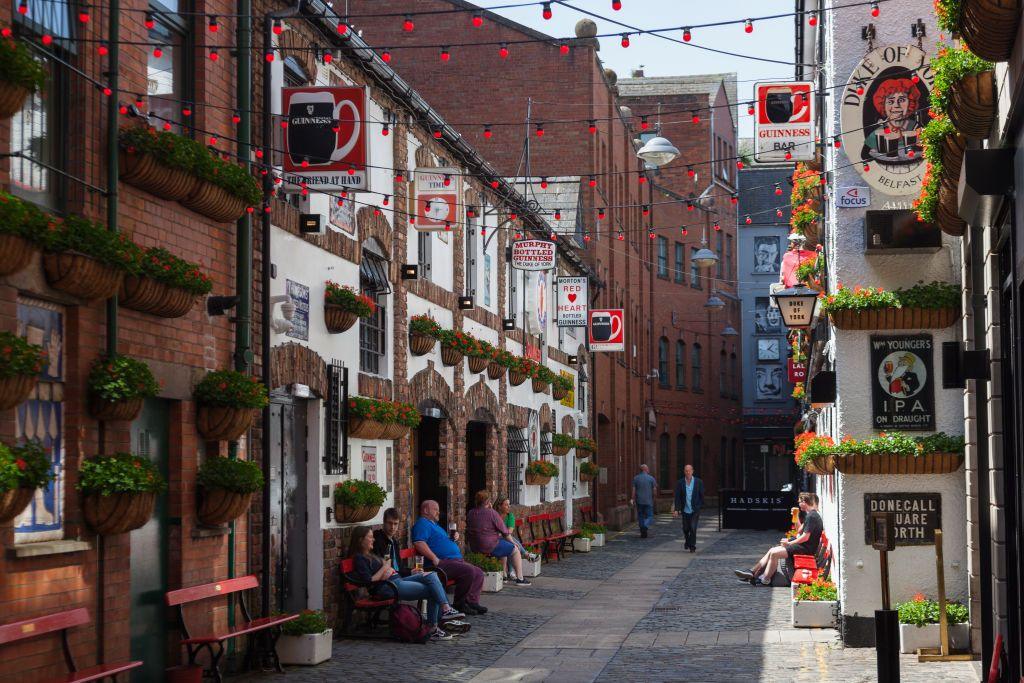
The Cathedral Quarter in Belfast is known for its creative and cultural scene
Looking to the future, Mr Kelly isn't chasing scale or status.
"We don't need to be the biggest festival in Ireland.. If we do 100 shows and each of them are amazing, I'm happy with that."
The Cathedral Quarter, Belfast's nightlife and arts epicentre, has changed significantly in the last 25 years, he explained, and a "spiritual need" for music, comedy and theatre "is there and growing".
"When we started there was no Black Box, there was no Mac Theatre, the Oh Yeah Music Centre... there was no real infrastructure in the area, all that has improved greatly."
These spaces need protected, he added.
"We need to make sure that however successful the Cathedral Quarter becomes, however great the bar and restaurant culture is, the artists are respected," he said.
'It was a no-brainer'
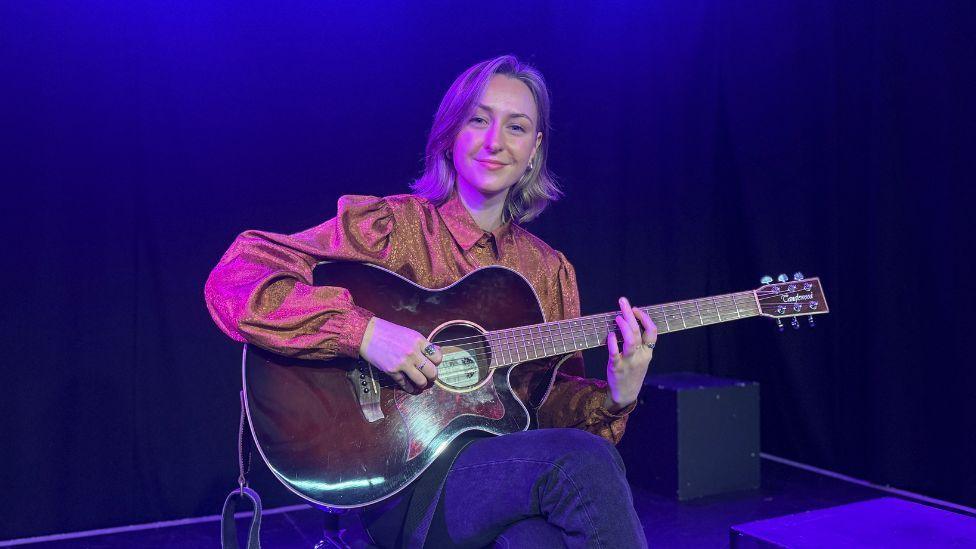
Indie-folk musician AOIBHA is this year's Artist In Residence
Artists like Belfast-born singer-songwriter AOIBHA, who is stepping into a new role as the 2025 Artist in Residence at the festival - a moment she describes as both an honour and a full-circle experience.
The role sees AOIBHA deeply involved with the festival, performing multiple support slots and culminating in her own headline show on 10 May.
It's a position she doesn't take lightly, reflecting on how previous artists in residence inspired her.
"I've really looked up to them," she said. "When I was offered the opportunity it was a no-brainer."
A passionate advocate for Belfast's arts culture, AOIBHA credits the city's small size for fostering creativity.
"The people are fantastic - welcoming, kind, and with the best sense of humour," she said.
"It's a city where you can quickly get to know other musicians in the scene, different venues... There's a real ability to build community and build strong connections."
As for her upcoming shows during the festival, AOIBHA is especially excited about supporting acts like The Magic Numbers, Luca Fogale and Bernard Butler.
Still, it's her own headline show at the Harrison Hotel that stands out.
"It's a unique space for a gig," she said. "I don't think anything like this has happened in that room before, so I'm really excited by the challenge."
This moment is more than just a career milestone, it's a reflection of years spent immersed in Belfast's music community, both on and off the stage.
"There were so many times I stood in the audience thinking: 'One day, I want to play on that stage'," she said.
"It feels like a really important time for me now, I'm there, it's really significant."
Related topics
- Published29 May 2024
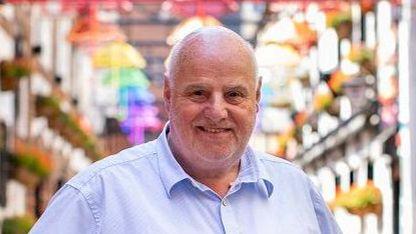
- Published16 June 2024
